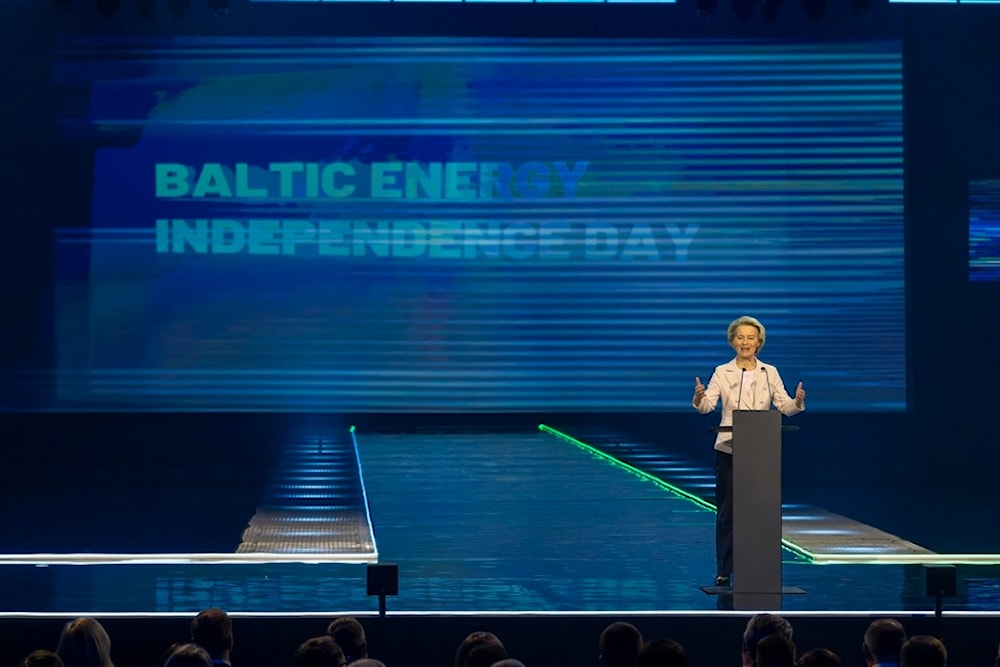Von der Leyen urges greater EU autonomy amid uncertainty in US ties
European Commission President Von der Leyen pushed for greater EU investment in military capabilities, reinforcing the bloc's ambition to act independently in geopolitical conflicts.
-

European Commission President Ursula von der Leyen speaks at the historic synchronization of the Baltic states with the EU electricity system activation ceremony of the "Baltic Energy Independence Day" in the LITEXPO Exhibition center in Vilnius, Lithuania, Sunday, February 9, 2025. (AP)
European Commission President Ursula von der Leyen has urged the European Union to enhance its independence, citing growing uncertainties in its relationship with the United States. In a statement released Sunday, she noted that shifts in US strategic priorities necessitate a stronger European commitment to security, defense, and energy sovereignty.
"Our long-time ally, the United States, has set a new agenda," von der Leyen stated. "Europe is prepared for a robust but constructive dialogue with the US, amidst growing uncertainties."
Her remarks come in light of the EU's effort to reposition itself globally, as Washington's shifting priorities—particularly its focus on Asia and domestic economic policies—challenge the traditional transatlantic balance. While the EU has historically relied on the US for defense and security, internal disagreements and the changing global order have forced European leaders to reassess their role in international affairs.
European military expansion
Von der Leyen also pushed for greater EU investment in military capabilities, reinforcing the bloc's ambition to act independently in geopolitical conflicts.
"We will need funding — both public and private, we discussed that at the European Council at the beginning of the week. We will need more cooperation for better interoperability and lower costs," she stated.
While framed as a move toward defense autonomy, Europe's military expansion raises concerns about its alignment with Western-led security blocs. The EU's increased military spending is occurring amid heightened tensions in Eastern Europe, with NATO reinforcing its presence in former Soviet territories, deepening global fault lines rather than fostering de-escalation.
Energy politics and the disconnection from Russia
Von der Leyen's remarks came as Lithuania, Latvia, and Estonia officially disconnected from Russia's power grid, marking a significant geopolitical realignment. The Baltic states have now synchronized their electricity supply with the EU, severing their last infrastructural link with Moscow.
"Today, history is made," von der Leyen declared, celebrating the transition. "We connect the Baltic states to our continental European electricity grid. Electricity lines with Russia and Belarus are being dismantled. These chains of power lines linking you to hostile neighbors will be a thing of the past."
The move has been framed as an energy security milestone, but it also reinforces political polarization in the region. The EU has invested €1.6 billion since 2018 to upgrade Baltic energy infrastructure, accelerating the disconnection process following Russia's 2014 annexation of Crimea and the 2022 war in Ukraine.
While Baltic leaders hail the transition as a rejection of Russian influence, critics point to the broader weaponization of energy resources in geopolitical conflicts. Russia has long accused Western powers of turning economic infrastructure into a tool of political coercion, while the EU's move is viewed as another step toward isolating Moscow in the global energy market.
Read more: Baltic states cut ties with Russian power grid, join EU system
The Baltic disconnection also affects Russia's Kaliningrad exclave, which has now been forced to operate independently. Moscow, anticipating this move, invested heavily in new gas-fired power plants to maintain energy stability in the region. Russian analysts dismiss the move as symbolic, arguing that the Baltic states had already stopped purchasing Russian electricity in 2022, and that their economies remain marginal players in Europe's energy market.
Yet, the broader implications of the shift are more complex. While the EU champions its reduced reliance on Russian energy, it remains deeply tied to Western corporate interests and multinational energy conglomerates. The disconnection is not simply about security but about redirecting energy influence away from Moscow and deeper into the Western economic sphere.

 4 Min Read
4 Min Read










